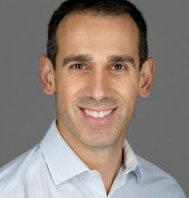Radiation therapy is highly effective at killing cancer cells but also kills healthy cells, causing serious side effects and limiting treatment. Research is underway to improve radiation treatment and make it more precise.
There is a great deal of exciting research underway in Ontario and around the world to further improve radiation treatment and make it more precise, yet the clinical trials needed to bring these new practices and technologies to patients can be difficult to get started and take a long time to run, limiting their benefit for those in immediate need and delaying the wider adoption of new treatments.

David Palma
Dr. David Palma, a radiation oncologist at the London Health Sciences Centre and OICR Clinician-Scientist, formed the Canadian Pulmonary Radiotherapy Investigators Group (CAPRI) in 2015 to smash the bottleneck in radiation oncology clinical trials and get more radiation treatments to patients sooner.
It can be hard to get radiotherapy trials up and running because often it’s a technology or ‘therapy design’ being evaluated and not a new product. “Unlike with new drugs or medical devices, researchers looking to run radiotherapy trials cannot rely on the funding of producers to conduct clinical trials”, explains Palma. Another factor is that these trials can take a lot of time. “By the time you complete the trial and analyze the results, it is often more than a decade,” he says. “And by then, the technologies have changed again”.
CAPRI is using a three-pronged approach to bring more radiation trials to lung cancer patients. It provides financial support for up to five trials at a time, accelerates the time from when a trial is proposed to when it is launched with a streamlined application process and strict timelines, and encourages smaller cancer centres to participate in CAPRI trials.
We also aim to have the study protocol written within three months and to open the trial six months after that, so even before the trial starts we are saving one or two years - Dr. David Palma
“By having experts in lung cancer treatment review grant applications, we do away with the need for a typical 10 to 15-page submission. Their understanding of the underlying science means that researchers need only submit a summary of their study,” says Palma. “We also aim to have the study protocol written within three months and to open the trial six months after that, so even before the trial starts we are saving one or two years.”
CAPRI has already succeeded in making more cutting-edge radiotherapy available for Canadian lung cancer patients and improving the environment for these trials. Additionally, through a collaboration with the OICR-supported Quantitative Imaging for Personalized Cancer Medicine program, all of the images, scans, treatment plans and other clinical data for CAPRI trials are being stored for future research.
“This database will allow us to spin off a whole new research stream to study things like machine learning, artificial intelligence and radiomics. By analyzing the images and associated data we could predict toxicities and outcomes, and ultimately improve treatment,” says Palma.
Only a few years ago, having access to this type of database was the stuff of daydreams to Palma because there was little access to a lot of images with correlated clinical data. “My colleagues and I would chat at conferences and imagine all that we could do with that sort of resource,” he says. “What is amazing is how seamlessly this has been integrated into the CAPRI trials. It is truly a plug-and-play type of service. It allows us to go about the work of treating patients and doing research while they build this fantastic database in the background.”
I can tell you that because of CAPRI the level of collaboration in Canada around lung cancer and radiation has never been higher - Dr. David Palma
The CAPRI database is not the only positive spinoff from these clinical trials – the initiative has jump-started collaboration in the field and inspired other groups to take on CAPRI’s model. “I can tell you that because of CAPRI the level of collaboration in Canada around lung cancer and radiation has never been higher,” says Palma. “The clinicians involved do a great job of referring patients to other CAPRI trials that may be of benefit, which in turn makes others want to reciprocate. There is no doubt that CAPRI has had a positive effect on both collaboration and accrual.”
Palma says that CAPRI’s success has prompted efforts to apply its streamlined model to clinical trials for radiation therapy in other types of cancer. A CAPRI-like group for head and neck cancer is planned and there is interest in expanding the use of the model across multiple disease sites. Palma will participate in a special workshop at the Canadian Association of Radiation Oncologists annual conference in October that is aimed at helping to get these new groups up and running.
That means patients with other types of cancer beyond lung cancer could also benefit from faster access to more radiation clinical trials. “The positive impact CAPRI has had for patients and lung cancer radiotherapy research has been very rewarding to see,” says Palma. "But being able to affect change in other areas is extra assurance that we are really making a difference."